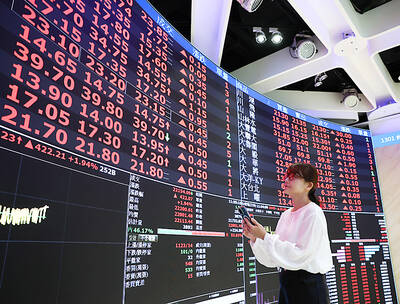A local think tank yesterday revised its forecast for the nation’s GDP to a fall of 4.6 percent this year, citing warmer trade with China, although the figure is the lowest among all domestic institutes.
Polaris Research Institute (寶華綜合經濟研究院), which predicted in March the economy would contract 4.8 percent, said yesterday rush orders from China were stronger than expected and would buffer the impact of the global slump.
“The economy, which dropped 10.24 percent in the first quarter, saw a rebound this quarter, owing to rush orders from China that curbed the freefall in exports,” Liang Kuo-yuan (梁國源), president of the Taipei-based institute, told a media briefing.
The institute expects GDP to decline 8.04 percent and 3.58 percent in the second and third quarters respectively, and recover to 3.87 percent growth in the fourth quarter.
The main problem will be private investment, predicted to plunge 29.78 percent.
Exports, the main driver of economic growth in recent years, are expected to weaken 12 percent, compared with the 15 percent estimate three months ago, the report said.
While the pace of deterioration in exports slowed, the magnitude remains serious, Liang said, predicting that the central bank would maintain its loose monetary policy and leave interest rates at their current low levels.
“A rate hike now is too early,” Liang said. “The rising crude oil cost is out of tune with the world economy.”
The top monetary regulator is due to convene its quarterly board meeting and adjust interest rates, if necessary, on Thursday.
Liang said that recovery in Taiwan would have to wait until the world economy heals were it not for China’s intervention.
Because of political factors, Chinese orders for consumer electronic products come to Taiwan instead of South Korea, Liang said, adding that Chinese tourists to Taiwan also increased noticeably in recent months because of encouragement from Beijing.
Liang predicted the local currency would trade at an average NT$33.4 against the greenback.
“While improving cross-strait ties are favorable for the NT dollar, the demand for the US currency will not disappear,” the economist said. “The room for the NT dollar to fluctuate either way is limited.”
The institute expected consumer prices to sink 0.78 percent this year, saying that retailers will keep prices down to stimulate private consumption amid the recession.

UNCERTAINTIES: Exports surged 34.1% and private investment grew 7.03% to outpace expectations in the first half, although US tariffs could stall momentum The Chung-Hua Institution for Economic Research (CIER, 中華經濟研究院) yesterday raised its GDP growth forecast to 3.05 percent this year on a robust first-half performance, but warned that US tariff threats and external uncertainty could stall momentum in the second half of the year. “The first half proved exceptionally strong, allowing room for optimism,” CIER president Lien Hsien-ming (連賢明) said. “But the growth momentum may slow moving forward due to US tariffs.” The tariff threat poses definite downside risks, although the scale of the impact remains unclear given the unpredictability of US President Donald Trump’s policies, Lien said. Despite the headwinds, Taiwan is likely

READY TO BUY: Shortly after Nvidia announced the approval, Chinese firms scrambled to order the H20 GPUs, which the company must send to the US government for approval Nvidia Corp chief executive officer Jensen Huang (黃仁勳) late on Monday said the technology giant has won approval from US President Donald Trump’s administration to sell its advanced H20 graphics processing units (GPUs) used to develop artificial intelligence (AI) to China. The news came in a company blog post late on Monday and Huang also spoke about the coup on China’s state-run China Global Television Network in remarks shown on X. “The US government has assured Nvidia that licenses will be granted, and Nvidia hopes to start deliveries soon,” the post said. “Today, I’m announcing that the US government has approved for us

When Lika Megreladze was a child, life in her native western Georgian region of Guria revolved around tea. Her mother worked for decades as a scientist at the Soviet Union’s Institute of Tea and Subtropical Crops in the village of Anaseuli, Georgia, perfecting cultivation methods for a Georgian tea industry that supplied the bulk of the vast communist state’s brews. “When I was a child, this was only my mum’s workplace. Only later I realized that it was something big,” she said. Now, the institute lies abandoned. Yellowed papers are strewn around its decaying corridors, and a statue of Soviet founder Vladimir Lenin

The National Stabilization Fund (NSF, 國安基金) is to continue supporting local shares, as uncertainties in international politics and the economy could affect Taiwanese industries’ global deployment and corporate profits, as well as affect stock movement and investor confidence, the Ministry of Finance said in a statement yesterday. The NT$500 billion (US$17.1 billion) fund would remain active in the stock market as the US’ tariff measures have not yet been fully finalized, which would drive international capital flows and global supply chain restructuring, the ministry said after the a meeting of the fund’s steering committee. Along with ongoing geopolitical risks and an unfavorable